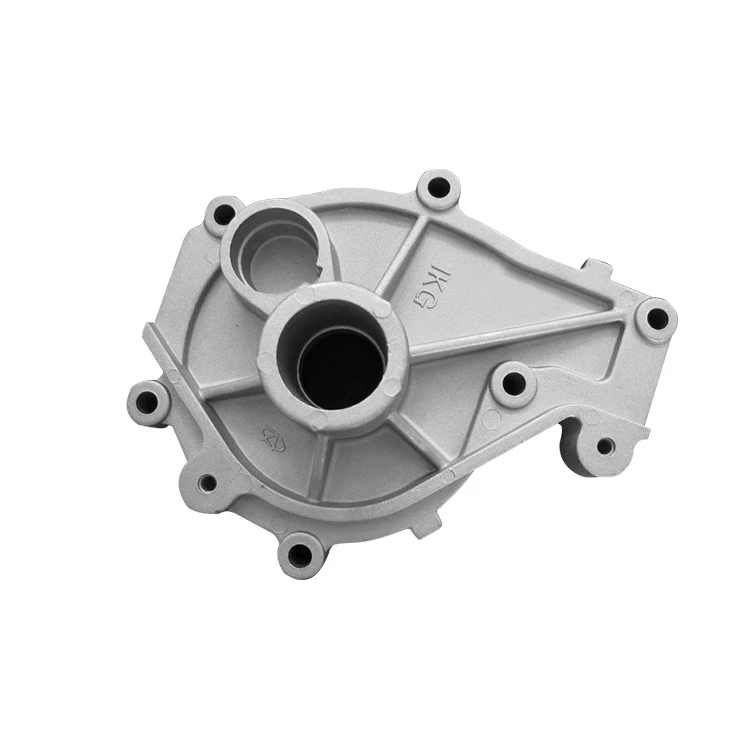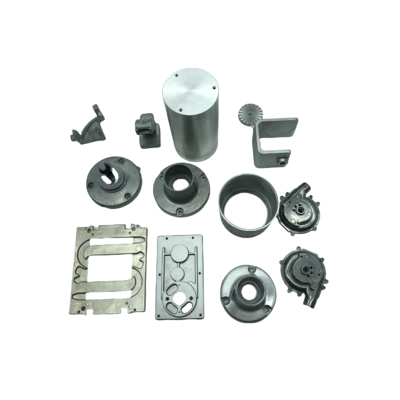Exploring the Ingenious Procedures Behind Modern Light Weight Aluminum Shop Operations
Modern light weight aluminum foundry procedures are undertaking considerable improvement. Automation and AI are improving manufacturing approaches, enhancing both effectiveness and accuracy. The assimilation of 3D printing is simplifying mold and mildew development, while sustainability methods are coming to be much more crucial. Each of these advancements plays an essential duty in redefining the sector. Nevertheless, the ramifications of these changes expand past simple production efficiency. What difficulties and chances lie in advance for aluminum foundries in this developing landscape?
The Duty of Automation in Light Weight Aluminum Foundries

Automation adds to improved security requirements within the shop environment. By moving hazardous tasks to machines, human workers can concentrate on managerial functions and quality assurance, reducing the danger of mishaps. Additionally, data analytics obtained from automated procedures give valuable understandings into operational efficiency, resulting in much better decision-making and continual enhancement. As the demand for aluminum items expands, the fostering of automation technologies will likely expand, better transforming the landscape of light weight aluminum factory procedures.
Advancements in Spreading Technologies
Current innovations in casting technologies are transforming aluminum factory operations. Innovations such as 3D printing assimilation, advanced alloy formulas, and automated procedure optimization are boosting performance and item top quality. These growths are pivotal in fulfilling the evolving needs of the industry.
3D Printing Combination
Integrating 3D printing modern technology into aluminum shop operations has actually reinvented conventional spreading approaches, improving both efficiency and accuracy. This innovative strategy permits for the quick manufacturing of complex mold and mildews and cores, significantly decreasing preparations and product waste. By making use of additive manufacturing, shops can develop complex geometries that were impossible or formerly challenging to accomplish with traditional strategies. The versatility of 3D printing additionally enables fast layout alterations, fostering an extra dexterous manufacturing process. Additionally, this assimilation supports the use of lightweight frameworks, which is progressively important in markets such as auto and aerospace. As light weight aluminum factories proceed to take on 3D printing, they position themselves at the center of technical advancement, driving renovations in product top quality and functional abilities.
Advanced Alloy Formulations
The growth of innovative alloy formulations has considerably improved spreading modern technologies in light weight aluminum factory procedures. These solutions integrate various aspects, such as copper, magnesium, and silicon, to improve mechanical homes and thermal resistance. By tailoring the structure of light weight aluminum alloys, manufacturers can attain particular efficiency attributes that fulfill the demands of diverse applications, from auto components to aerospace frameworks. Using innovative alloys likewise contributes to minimized weight and enhanced strength, which are critical consider modern-day design. Additionally, innovations in alloy advancement allow far better fluidness throughout spreading, leading to enhanced surface area coatings and reduced problems. In general, advanced alloy solutions represent a significant leap onward, positioning aluminum foundries to fulfill the developing needs of numerous sectors effectively.
Automated Refine Optimization
Innovations in casting technologies have led the way for automatic procedure enhancement in aluminum foundry operations. By integrating innovative software program and real-time data analytics, factories can currently improve production procedures and boost quality assurance. Automated systems keep track of variables such as temperature level, air conditioning, and stress rates, permitting immediate changes that lessen problems and waste. Additionally, artificial intelligence algorithms assess historical efficiency information to predict optimal settings, thus raising efficiency and reducing cycle times. Robotics also play a considerable duty, handling repeated tasks that improve safety and accuracy. In general, these developments not only drive functional effectiveness however additionally make it possible for factories to satisfy the growing need for high-grade aluminum elements in different industries.
Smart Manufacturing and Industry 4.0 Integration
The combination of Smart Manufacturing and Industry 4.0 within light weight aluminum foundries is transforming functional performance. By leveraging IoT technologies, automation, and robotics, factories can maximize production processes and minimize downtime. Furthermore, information analytics provides critical insights that improve decision-making and drive continual improvement.
IoT in Foundry Workflow
As suppliers significantly embrace the Web of Things (IoT), foundry operations are experiencing a transformative shift towards wise manufacturing and Sector 4.0 combination. aluminum casting. IoT modern technologies allow real-time information collection and analysis, enhancing decision-making processes and functional efficiency. Sensors and connected devices keep track of equipment efficiency, product use, and environmental conditions, enabling for positive upkeep and resource optimization. This connectivity fosters a more agile manufacturing atmosphere, where adjustments can be made promptly in response to market needs. Additionally, IoT promotes boosted traceability and quality assurance, as data from the whole production cycle can be quickly accessed and analyzed. On the whole, the combination of IoT in foundry operations considerably enhances productivity and drives advancement in light weight aluminum production processes
Automation and Robotics Combination
Automation and robotics combination is transforming light weight aluminum factory procedures by enhancing effectiveness and precision. This transformative strategy streamlines procedures such as molding, putting, and ending up, minimizing human error and increasing result uniformity. By employing advanced robot systems, shops can attain higher manufacturing rates while preserving rigorous high quality requirements. Automated systems also make it possible for real-time tracking and flexible control, permitting swift changes to manufacturing criteria. In enhancement, the combination of robotics reduces labor prices and reduces safety dangers connected with hands-on handling of liquified metal. As foundries accept smart manufacturing principles inherent in Market 4.0, the harmony in between automation and robotics solidifies their one-upmanship, leading the way for lasting growth and development in the aluminum casting market.
Data Analytics for Effectiveness
Utilizing data analytics greatly enhances efficiency within light weight aluminum factory procedures, aligning with smart production and Sector 4.0 concepts. By leveraging real-time information collection and analysis, shops more information can monitor manufacturing processes, forecast equipment failings, and optimize resource allotment. This data-driven approach facilitates informative decision-making, allowing managers to recognize bottlenecks and enhance workflow. Furthermore, anticipating analytics equips shops to prepare for market demands, thereby lowering waste and guaranteeing timely item shipment. Combination of data analytics with IoT tools boosts operational exposure, cultivating a positive upkeep society. Eventually, implementing these advanced logical strategies not only increases performance yet also drives development, placing aluminum foundries to meet the progressing demands of the industry while preserving one-upmanships in a quickly changing landscape.
Lasting Practices in Aluminum Casting
While the light weight aluminum spreading industry has actually generally dealt with ecological challenges, several factories are now embracing lasting practices to minimize their effect (Precision aluminum casting). A significant focus has been on recycling light weight aluminum scrap, which not just lowers waste however also preserves energy compared to primary light weight aluminum production. Ingenious melting technologies, such as induction furnaces, enhance energy effectiveness and lower greenhouse gas exhausts
Additionally, shops are carrying out closed-loop water supply to minimize water consumption and reduce thermal contamination. Using eco-friendly binders in mold-making procedures is gaining grip, more reducing damaging emissions.
Some facilities are spending in eco-friendly power sources to power procedures, lining up with global sustainability goals. By incorporating these practices, the light weight aluminum casting market is evolving towards a much more environmentally liable future, showing that financial development can coexist with ecological stewardship - aluminum casting. These efforts reflect a dedication to sustainability and the value of environmental liability in manufacturing
Quality Assurance Innovations
As the light weight aluminum spreading sector breakthroughs in the direction of sustainability, the importance of quality control technologies ends up being increasingly evident. Modern light weight aluminum factories are adopting advanced modern technologies to boost their quality control processes. Techniques such as real-time surveillance and data analytics allow makers to detect disparities and issues early in the production cycle. Implementing automated inspection systems outfitted with device finding out algorithms guarantees that products satisfy rigid top quality criteria while decreasing human error.
Additionally, the assimilation of non-destructive screening methods, such as ultrasonic and radiographic examinations, gives deeper understandings into the stability of spreadings without harming the material. These developments not just enhance product reliability however also reduce waste, straightening with sustainability Aluminum Foundry goals. Additionally, the adoption of standardized top quality structures helps enhance operations across various foundries, ensuring consistency in output. Collectively, these improvements are reshaping high quality control, fostering a society of quality within the aluminum casting market.
Future Patterns in Light Weight Aluminum Factory Procedures
What innovations lie ahead for light weight aluminum foundry procedures? The future of light weight aluminum shops is positioned for improvement with advancements in automation, synthetic knowledge, and sustainable practices. The assimilation of robotics and automated systems is expected to improve effectiveness and accuracy in the casting procedures, lowering human mistake and labor prices. Furthermore, AI-driven analytics will certainly enable real-time monitoring and predictive upkeep, maximizing functional efficiency and reducing downtime.
Sustainability stays a prime focus, with factories progressively adopting green methods, such as utilizing recycled aluminum and developing low-emission melting technologies. Technologies in 3D printing are likewise expected to revolutionize mold-making, permitting complex geometries and reduced material waste. As the market welcomes digitalization, data-driven decision-making will end up being crucial, making it possible for shops to react swiftly to market needs. Jointly, these trends promise to redefine light weight aluminum shop procedures, making them more effective, sustainable, and versatile to future obstacles.

Often Asked Inquiries
What Precaution Are Executed in Light Weight Aluminum Shop Operations?
Aluminum factory operations apply various safety procedures, including individual protective devices, ventilation systems to handle fumes, regular safety and security training, emergency reaction strategies, and rigorous tracking of temperature and equipment to stop mishaps and guarantee worker safety and security.
Exactly How Do Shops Manage Labor Force Educating for New Technologies?

What Materials Are Frequently Recycled in Light Weight Aluminum Foundries?
Aluminum foundries frequently recycle scrap aluminum, consisting of post-consumer items like drink canisters, automotive components, and building and construction products. This recycling process decreases waste and saves resources, adding to a more lasting aluminum manufacturing sector.
How Does Aluminum Spreading Effect the Setting?
Light weight aluminum casting effects the setting via energy-intensive processes, greenhouse gas discharges, and prospective local contamination. However, developments in recycling and lasting techniques can mitigate visit this page these results, advertising a much more environment-friendly approach to aluminum manufacturing.
What Are the Common Lead Times for Light Weight Aluminum Casting Projects?
Typical preparation for light weight aluminum casting projects differ substantially, normally ranging from 2 to six weeks. Elements affecting these timelines include complexity, order dimension, and material availability, influencing overall production routines in foundry procedures.
Automation increasingly plays a vital duty in light weight aluminum shops, improving effectiveness and precision in the manufacturing process. Developments in casting technologies have actually paved the way for automatic procedure enhancement in aluminum foundry procedures. Harnessing information analytics substantially enhances efficiency within light weight aluminum shop procedures, aligning with clever manufacturing and Market 4.0 principles. A substantial focus has been on recycling aluminum scrap, which not just decreases waste yet also preserves energy contrasted to key light weight aluminum production. Aluminum factories typically recycle scrap aluminum, including post-consumer products like beverage containers, vehicle components, and building and construction products.